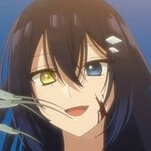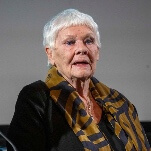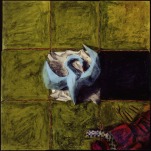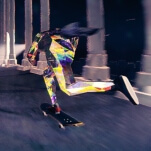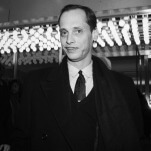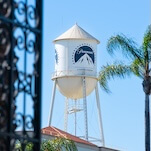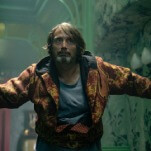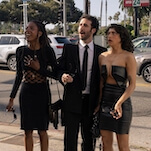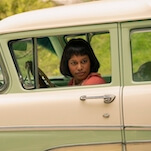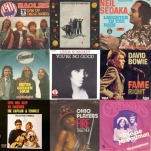Welcome to Random Roles, wherein we talk to actors about the characters who defined their careers. The catch: They don’t know beforehand what roles we’ll ask them to talk about.
The actor: Best—and probably forever—known as The Wire’s dogged Detective Lester Freamon, Clarke Peters has a stage and screen career that spans three decades. In London, where the Englewood, N.J. native has lived since the early ’70s, he’s a regular in West End theater, best known before The Wire as the creator and co-star of the musical revue Five Guys Named Moe. And since The Wire, he’s made his mark on Treme—as Mardi Gras Indian Albert Lambreaux—Damages, and Life On Mars, most recently turning up as the pivotal character in Spike Lee’s Red Hook Summer.
Red Hook Summer (2012)—“Enoch Rouse”
Clarke Peters: Spike gave me a call in the middle of a week last summer or last spring, and he said, “I’m coming to New Orleans and I want to show you something.” He showed up about 9 o’clock at my house, he put a script in my hand, and then went away and said that he’d see me in about six hours and we would discuss it. Well, after about an hour and a half or two hours, I read the script and I called him back immediately and said, “Why wait?” He came back and we talked about this, and about the issues that are being pointed out in the—well, I don’t want to reveal exactly what it is for those who aren’t here—but the issues that are being addressed in the piece itself, and how important it is for us to discuss these things. And after having that discussion with him, I said, “Well, what do you want me to do?” Because I didn’t realize he was offering me a job. And he said, “I’d like to have your blessing on that.” And I said, “Well, you’ve certainly got my blessing on that, because it’s a statement that needs to be said.” And he said, “You don’t understand what I’m saying.” I said, “No, you’ve got my blessing.” He said, “I want you to play the part of the bishop.” Well, I’ve been wanting to work with Spike for a couple of decades now, so for this to come up like that was… accurate in one of those spiritual kind of ways, I guess. So he said, “It’ll be a very quick shoot,” and he left me with the script and I put it aside and said, “Okay, well, if it happens it happens, if it doesn’t it doesn’t.” And then it got close to the day and it was happening and I thought, “Oh, shit. I’d better learn all this stuff!” [Laughs.] I was shooting Treme at the same time, and I was preparing to do Othello in England, so this sort of dovetailed right in the middle of that. And it was good working with him. We knew what we had to do and we got down and did it.
The A.V. Club: You have an extensive history in musical theater, and although Red Hook Summer isn’t a musical, it has elements of the form: not just the singing in the church, but the bright colors, and the fact that the score is much higher in the mix, more present, than it usually is.
CP: Well, there was no music, obviously, when we were shooting it. The only music that was present was the music that [organist] Jon Batiste pulled into the church. So music was never discussed, and what you saw the other night for the first time was what I saw for the first time. The way that the music was used, in some places it was just wonderful. It wasn’t gratuitous, but there are a lot of layers to the film, and music is definitely one of them. It’s all commenting on something. It’s not there just to take you from one scene to the other. If you listen to the lyrics while you’re watching, you’re thinking, “Oh, my gosh.” It was a little bit more profound than I anticipated.
AVC: The Wire and Treme, among other things that you’ve done, are much more about a community than individual characters, and that’s true of Red Hook Summer as well. Is that something that attracts you particularly?
CP: It seems to be happening in both ways. It’s something that I’m interested in, and it’s also what’s just been coming to me. To go back onto your previous question, I did a lot of musical theater in England, but even that is a part of this type of brief where the roles I was playing were roles that were traditionally for white actors, and I think if I was on any kind of mission—as it appears I’m on a mission now with all of these works here in America—it was just to open up people’s minds to this whole cross-cultural thing, because we’re living in a multicultural society in the West now. We have to be prepared to allow everyone to participate in harmony, and in order to do that we have to understand ourselves. So The Corner, The Wire, Treme, all of David Simon’s pieces are pieces that afford an opportunity for us to hold a mirror up to ourselves and to really look and scrutinize—and he’s not offering any answers. That’s what I was doing in London as well in theater. Just saying, “Wait a second. Why does Sky Masterson have to be a white guy from Colorado when he’s just the outsider? He could be a Japanese guy from Minnesota.” But somewhere along the line in life, you find that you’re in a chorus and you look around and you’re in the company of people singing the same song, you know? And I’ve been blessed to do that with David and with Spike.
Treme (2010-present)—“Albert Lambreaux”
AVC: Big Chief Lambreaux seems to be a character that New Orleanians have taken especially close to heart. Some parts of the culture travel better than others—jazz, for one—but the complexity of Mardi Gras is hard to grasp outside the city.
CP: Well, you have a couple of different Mardi Gras. You do have Mardi Gras, or Carnival, throughout South America. But what you have in New Orleans traditionally came out of two cultures that melded together for the mutual protection from the oppressor: enslaved Africans and the Native American Indians. So unfortunately—and really, it is very, very, very unfortunate, that a lot of the men and women who mask today do not know their history. But hopefully, in moments like this, we can talk about this and maybe they’ll pick up on it. The reason they masked as the Indians to begin with, was because, I think it was either the Spanish or the French stopped the Native American Indians from coming into the city during the holidays. And so the Africans that were there dressed as Indians to pay homage, to remember them, to make sure that their presence was there. That happened long before this Wild Bill, whatever his name is, that some historians want to say is where the Indian masking came from. They were doing that long before Buffalo Bill’s thing. Long before that, you know. So hopefully, for those who are interested, when you go down and see the Mardi Gras Indians, you’ll know that this is the confluence of two cultures being represented during Mardi Gras. And that what you get in that beadwork is some African styles of beading that are still prominent today in Central Africa, as they are in New Orleans. But if we’re ever to realize the American dream, we’ve got to really begin to start understanding each other and really changing how we view things on this continent now.
AVC: The problem of not knowing your own history comes up in Red Hook Summer, as it does in Do The Right Thing, and it turns out to have a very specific meaning in Red Hook with regard to your character that’s not just about appreciating the richness of your culture.
CP: That’s right, that’s right, yes. And even for Enoch, him not knowing the recent history. How did he know his son-in-law was killed in Afghanistan—you know? And how that reflects on all of us.
AVC: So what has your experience been in terms of the way people from New Orleans react to Lambreaux and that representation of their culture?
CP: What I’ve felt, finally, is that cliché—you can feel the love, you know? What a crap thing to say, “You can feel the love.” But you know what? In New Orleans, because of Lambreaux, and because of how David has written him and I’ve been allowed to play him, the residents feel compelled to express some love because of the representation. And it’s not just in the black community. He’s the voice of resistance of everybody who suffered at the hands of FEMA and Road Home and all of those social-assistance government organizations that were supposed to help the people—black, white, rich, poor, it doesn’t matter—and who got shafted and are continuing to be shafted by them. So we wound up being a voice for them. And some people don’t want to see it, don’t want to see the show because it’s too painful, and for others it’s a cathartic, healing experience.
Damages (2009)—“Dave Pell”
CP: Glenn Close is a fantastic actress. Oh, I love this woman. And a clown. I mean, she and Judi Dench—real actors. Real actors, yeah. Of quality. I love them. I really love them. Yeah, I would like to work with Glenn again, I really would. Our brief moment together was all too brief for me. We only had that one scene together. But it was so much fun.
AVC: It’s a great portrayal of how, for someone that high up the ladder, the exercise of power can be almost casual, in a way that’s hard to fathom for people who don’t have that kind of power.
CP: [Laughs.] Well, I didn’t know—I guess if I knew who the character was when I started, I might have approached him differently. But I never knew who that man was. I thought I was just doing that first episode. I was expected to do that one episode and that was it. And then they called me back for another episode, and by the third time I was saying, “Who is this? Give me some history.” Nobody knew who he was. And it probably served the piece well in performance, because no one knew who he was. Least of all himself! [Laughs.] So nothing could be telegraphed, which is good.
AVC: Having had the luxury of inhabiting a character for five years on The Wire and three on Treme—let alone a stage production, where you play the same role for a year or more—how does it compare doing something like Red Hook Summer, where the shoot is so brief?
CP: There’s no comparison. I guess the only comparison is that you know you have a job to do, and you put the blinkers on and you just run toward the goalposts and do as much as you can. Which is kind of what you do in life. You’re carrying your whole biography with you, but you’re not thinking about it. It just naturally informs what you do. Shooting Red Hook, there wasn’t a lot of time to do a bunch of research. Fortunately, there was a good story arc. He had the beginning, middle, and end. That’s something you always get in theater, but you don’t always get immediately in a television series. You just never know where David Simon’s going to take you next week, so you don’t have time to settle into anything. But with Red Hook, I said before, what needed to be said was part of the motivation, and where he came from, our sense of what our history is here in America—and I say “our history” [meaning] African-Americans. And us being on the same page facilitated how quickly we could get this thing done and find the nuances that needed to be exposed.
AVC: How important is it to you that the piece be saying something worth saying. That seems to be coming up a lot.
CP: It’s becoming more and more important, because of the influence of music, of theater, of media, television, cinema, but also because it takes us back to what an artist is supposed to do. We’re not commodities that you just put up on the shelf and you bring down when you need to. Art is just as important in your society as economics is and as politics is. And if it’s not serving that purpose, then it’s just a wank thing. It’s just your own personal self-gratification. It should be there to inform, to educate and to open up vistas for other people. We’re standing on the shoulders of people who came before us trying to do something. Television is nowadays just a vehicle for another company to put a commercial on to sell some shit that you don’t need. So it is becoming more important. Fortunately, the Lord has put some really nice stuff in my path, and I hope that she continues to do so. But yeah, I don’t want to do any crap. I don’t want to do crap.
Five Guys Named Moe (1990/2010)—“Four-Eyed Moe”/“Nomax”
AVC: You wrote the book for and starred in the stage musical Five Guys Named Moe, which uses songs by Louis Jordan to dissect a broken man’s relationship. Originally, you were one of the singing Moes, and then in the 20th-anniversary production, you played the jilted Nomax. You said that in revisiting the piece you felt freer to explore aspects of Nomax’s character, especially ones that weren’t so positive. What did that mean?
CP: Well, when Five Guys first came on it, we were really under the clock. I presented at the National Theater one evening, and then put it away. And then out of nowhere, Philip Hedley says, “Would you like to do that again?” I said, “Yes.” He said, “Can you be ready in about three weeks?’” I thought, [strained] “Yeah!” So I flew to New York to find my musical director, sort out my choreographer, I spent three weeks trying to get people together without going back to addressing the original script, which we wound up doing in rehearsal. So when it hit the stage, you’re sitting there looking and thinking, “Oh, gosh, I wish I could have done that.” And very rarely do you get a chance to do so. This time I had. And I was able to put some other nuances in there, some other points of view into it. So I think it was that that I was addressing in that particular interview.
AVC: What were those nuances?
CP: Well, [Barry White voice]: black love. What it feels like, what any man who really digs his lady goes through, man! We’re full of the bravado and ego and shit, you know, when there’s sometimes you just feel like, “Hey, I wish I had someone I could just talk to about this shit, because I really don’t know what to do.” There haven’t been a lot of great role models anywhere, in any society. So these five guys, I was able to put more in their mouths in terms instruction, and it came up more in how a song was introduced, how they used the song to inform his situation. So it gave me more time to do that, and it was 20 years since we did it, so I’m that much older.
AVC: There must be a lot more life experience going into it now.
CP: Now there is. And we did something different. Before they came out of the radio. In this production, he was absorbed into a gramophone. And even that has certain information about it, because those gramophones are gone now. You know, where is that shit?
AVC: Part of the underpinning of the show is that he’s being surrounded by the songs, being taken into their world, which is not always the real world.
CP: That’s right, so sometimes some things are ironic. [Laughs.] Like “[I Like ’Em] Fat Like That.” What a sexist song. It really is, you know? But if the man that is singing it is honest about who he digs, whatever his penchant is, that’s valid. And don’t mess with him. Don’t be influenced by the little lie, the things you see in the adverts. Yeah, a healthy, buxom lass, you know.
AVC: Sexism isn’t an admirable part of the human character, but it is undeniably a part of it.
CP: Yes. So let’s address all that. It’s time. I was listening to a thing by Deepak Chopra, and he’s talking about the metamorphosis of caterpillars into butterflies. He was saying that the caterpillar gets so greedy it eats what its metabolism can’t keep up, and so what happens is that things begin to liquefy, and in liquefying it releases a gene, and in this particular gene is the code for wings. And he was using that analogy saying that society’s kind of like that today. We’ve become so greedy that we want to move away from a lot of this stuff, but somewhere inside of us there is that gene for change. So things are looking really miserable out there—the sexism, the racism, the corrupt politics, the pollution, and all of it is the soup that we need in order to release that gene inside of ourselves. And I thought that was just a wonderful, wonderful metaphor.

